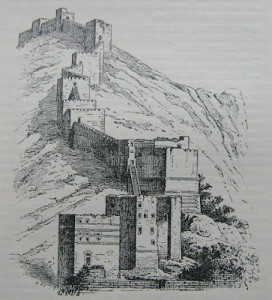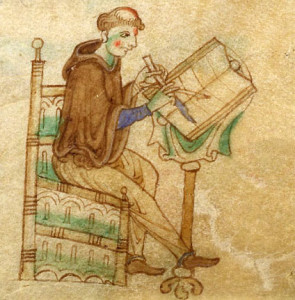One of the notorious players in Eleanor of Aquitaine’s life story is her paternal uncle Raymond of Poitiers, Prince of Antioch. His notoriety is caused not least by the rumours of an affair between him and his niece when she visited him in his city during the second crusade.
We don’t have a solid birth date for Raymond. Wikipedia says circa 1115, but since he was at the court of Henry I of England in 1130, I would err on the side of that circa meaning some time before 1115. His parents were William IX, Duke of Aquitaine, and his second wife Philippa, daughter of Count William IV of Toulouse. His older brother William was destined to become Duke of Aquitaine and father of the above mentioned Eleanor, but there was no inheritance for young Raymond and he left Aquitaine to seek his fortune at the court of Henry I, King of England where he was welcomed among the able young courtiers surrounding the king. There is charter evidence for him being there by 1130 when he was pardoned the sum of 7 shillings.
While Raymond was occupied at the English court, doings were afoot in the Holy Land. The Christian held Principality of Antioch was in need of a ruler. Bohemond II, lord of Antioch had been killed at the Battle of Mamistra in 1131. His head had been cut off, enbalmed, and sent in a silver casket to the Caliph of Baghdad. He left behind his widow, Alice, sister of Queen Melisande of Jerusalem, and his small daughter, Constance. Through his maternal bloodline, Bohemond was related to the French royal house and was cousin to Louis VII, husband of Eleanor of Aquitaine.
King Fulke of Jerusalem and Queen Melisande began casting around for a husband for Constance and their gaze lit upon young Raymond of Poitiers. Fulke’s son was married to Henry I’s daughter, and it is feasible that the recommendation came to Fulke and Melisande via influences at the English court.
A Hospitaler knight called Gerard Jebarre was sent to England to fetch Raymond to his new calling. The journey from England to Antioch was difficult because the politics of the Mediterranean and the Middle East meant that there were those who had no wish to see Raymond take up the reins. The young man had to travel in secrecy, disguising himself as a pilgrim and as a merchant’s servant, but he was fortunate and managed to slip through the blockade, arriving in Antioch in April 1136.
His arrival could not be hidden from the Princess Alice, Constance’s mother who was still a young and fertile woman, and expected to become Raymond’s bride. However, the politics of the moment were geared toward uniting her daughter with Raymond. Young Constance had the blood of Count Bohemond in her veins and Alice did not. Also Constance was a lot more malleable than her mother.
While Alice waited expectantly in her palace to receive her future new husband,nine year old Constance was kidnapped and married to Raymond in haste by the patriarch of Antioch. Thwarted, unable to fight for her position and rights, Alice retired to fulminate on her dower estates in Lattakieh.
Raymond took up governing his new principality. He is described by contemporaries as handsome, tall and elegant. He possessed immense physical strength – he was supposed to be able to bend an iron bar with his bare hands and was nicknamed ‘Hercules’. He was skilled in the use of arms and militarily experienced. Although not literate himself, he fostered those who were and enjoyed culture. He liked gambling and was known to be impetuous and hot-tempered, but he also had a high reputation for gallantry and purity of conduct (words in bold for a reason). He attended church regularly and from what can be gathered, was a faithful husband to Constance who in the fullness of time bore him a son Bohemond, and daughters Maria and Philippa.
Raymond had a difficult row to hoe politically and I only touch on it in passing in my novel The Summer Queen as it’s not part of the novel’s brief. Suffice to say that as his rule progressed, the divisions between the Christian princes widened and the Muslim opposition took advantage where they could, with the result that the neighbouring principality of Edessa fell in 1144 and help was sought in Europe, culminating in the debacle of the second crusade. Raymond himself wrote to Louis of France, his wife’s kin, seeking aid for Antioch and Edessa. He might have expected plenty of help because the Queen of France, Eleanor, was also his kin – his own niece and Duchess of Aquitaine. When he wrote to the royal couple, requesting aid, he accompanied his plea with all manner of costly gifts (some might say bribes) from Antioch.
Raymond, as the brother of the last duke of Aquitaine, was the male figurehead of that particular dynastic household, even while Eleanor was the reigning duchess. His word would have carried clout in an advisory capacity with her and with the men of Aquitaine she had brought with her.
Louis was keen to go on a dual pilgrimage/crusade and Eleanor accompanied him. The reasons behind her presence on the crusade have been fair game for writers of historical fiction and biographers alike. Some biographers and novelists have portrayed her being bored to tears and champing at the bit to be gone from France and heading off on a giddy adventure. Others have seen it as a case of Louis bringing her along because there was no telling what she might do if left to her own devices in France during his absence. Besides, he needed her as the queen bee in the hive to keep the Aquitaine troops loyal and engaged.
Raymond seemed to hope that Eleanor would be able to influence Louis and persuade him to campaign with him in assaulting the city of Aleppo which was the greatest threat to Antioch’s security. He ‘counted greatly on the interest of the queen with the lord king.’ And of course his own wife was kin to Louis, so perhaps he hoped for a certain amount of persuasion from that direction too. He quickly discovered that it was not to be the case. Eleanor might heartily agree with her uncle, but her relationship with Louis had reached a stage where she was of a mind to part company with him, something she announced at Antioch, perhaps because she then had access to the protection and support of powerful male kin. Far from being a bridge between the two men, Eleanor was a divider.
Eleanor and Louis set out for the Holy Land in the spring of 1146 and after a series of difficulties along the way, arrived in Antioch in the middle of March 1148. Raymond was delighted to see them and rode out to greet them at the port of St. Symeon and welcome them to his city.
Eleanor spent so much time in her uncle’s council during the time she and Louis were in Antioch, that various chroniclers and clerics would find it a source of scandal and hint at improprieties committed that went far beyond the pale. Eleanor’s biographers have debated long over the matter of whether Raymond of Poitiers and his niece became incestuous lovers during her sojourn in Antioch and novelists have had a heyday.
The main players are dead; we can’t ask them and perhaps they wouldn’t tell, but there are certain pointers that lead me to believe that Eleanor and her uncle did not have an incestuous fling during her stay in Antioch. That’s not to say that there wasn’t an ‘incident’ while she was there. Something patently did happen to knot the underwear of the chroniclers, but my own thought run along these possibilities, above that of incest.
1. The chroniclers are referencing a different scandal to the one everyone has assumed involves Eleanor and her uncle.
2. The references are to some kind of political plot against Louis between Eleanor and her uncle, a plot that might involve Eleanor deserting Louis and remaining for a time (at least), in Antioch under her uncle’s protection.
Chronicler John of Salisbury is our most reliable source. He’s a sober type of chap not given to making stuff up just because it’s colourful and he feels like it. (unlike Gerald of Wales, who is less picky about truth and lies). Having said that, historian Andrew Buck has pointed out to me that both John of Salisbury and William of Tyre, the main Outremer chronicler of the time, were as prone to fabrication and political manipulation of their work as many other medieval writers, and William of Tyre looked to Jerusalem and was not exactly pro-Antiochene in his stance.
John of Salisbury says:
In the year of grace 1149 (March 1148) the most Christian King of the Franks reached Antioch, after the destruction of his armies in the east, and was nobly entertained there by Prince Raymond, brother of the late William count of Poitiers. He was as it happened the queen’s uncle, and owed the king loyalty, affection and respect for many reasons. (John of Salisbury does not say what these reasons are). But whilst they remained there to console, heal and revive the survivors from the wreck of the army, the attentions paid by the prince to the queen, and his constant, indeed almost continuous conversation with her, aroused the king’s suspicions. These were greatly strengthened when the queen wished to remain behind, although the king was preparing to leave, and the prince made every effort to keep her, if the king would give his consent. And when the king made haste to tear her away, she mentioned their kinship, saying it was not lawful for them to remain together as man and wife, since they were related in the fourth and fifth degrees. Even before their departure a rumour to that effect had been heard in France…. At this the king was deeply moved; and although he loved the queen almost beyond reason he consented to divorce her if his counsellors and the French nobility would allow it. There was one knight amongst the king’s secretaries called Terricus Gauleranicus, a eunuch whom the queen had always hated and mocked, but who was faithful and had the king’s ear like his father’s before him. He boldly persuaded the king not to suffer her to dally longer in Antioch both because ‘guilt under kinship’s disguise could lie concealed.’ (a quote from Ovid). and because it would be a lasting shame to the kingdom of the Franks if in addition to all the other disasters it was reported that the king had been deserted by his wife, or robbed of her. So he argued, either because he hated the queen or because he really believed it, moved perchance by widespread rumour. In consequence she was torn away and forced to leave for Jerusalem with the king; and their mutual anger growing greater, the wound remained, hide it as best they might.’
Was the above hinting that Eleanor and Raymond had totally lost their wits and their political sanity and been so overwhelmed by lust that in the circa ten days they were together they committed incest? Nothing in the above piece suggests this, even though some modern biographers appear to think it damning and authors of historical fiction have had a field day. Is it possible? Absolutely. Is it likely on a scale of 1-10? Ummm, how about a 1?
That Eleanor wanted out of her marriage is obvious and that Raymond was willing to help her in this is obvious too. Louis had chosen not to throw in his lot with Raymond and attack Aleppo, and the state of the relationship between Louis and Eleanor meant that she was not a good bridge as a peacemaker between the two men. With Louis determined to go on to Jerusalem, it could well be that Raymond wanted to retain the men of Aquitaine for his own projects and how better to do it that than to keep Eleanor with him? I have no doubt that Eleanor and Raymond sided with each other. It stands to sense they would and John of Salisbury’s description bears this out. But to have an incestuous relationship? If one looks at the timing, the characters, and the political situation, it adds up to a whacking negative.
Both were highly intelligent and astute; one a ruler of a great Middle Eastern principality and the other the Queen of France and Duchess of Aquitaine. They had huge political roles as well as personal lives. In those personal lives, Raymond was commended for purity and faithfulness. Eleanor’s reputation was not so lily-white but down to hostility from the court and the church based among other things on her inability to provide Louis with a male heir and some disastrous headstrong decisions taken in her teen years concerned with her sister. She may well have liked to flirt – and we don’t even know if she did – but if so, that still doesn’t make her a sex mad idiot. Condemnation of her character is not universal either, and there are texts such as the Histoire de Guillaume le Mareschal that sing her praises.
Eleanor spent less than two weeks in Antioch and part of that time was recuperating from a difficult sea journey and earlier trials in Anatolia. It hardly seems likely that she and Raymond would get down and dirty in that short space of time in what would be tantamount to a one night stand. However, she may well have been plotting to overthrow her husband or dump him. Chronicler William of Tyre says that Eleanor was a ‘rash woman. Lost to all sense of queenly dignity, she disregarded the marriage bond and forgot her duty to be faithful to her husband.’ But he was only eighteen when the Antioch incident happened and not on site, and being faithful to one’s husband in the medieval sense also had the connotation of keeping faith and didn’t automatically mean the sexual act. To think that it did shows the same problematic modern mindset that believes Richard I and Philippe Augustus sharing a bed makes them sexual partners.
William of Tyre never names the man in his accusation, which is is interesting. Historians have always taken it to be Raymond, but if one does go down the road of believing Eleanor sought comfort elsewhere, then perhaps they should widen the field and look to other, less closely related men – but of course that’s another story.
Eleanor would not be the first queen accused by enemies of plotting with a lover. Melisande of Jerusalem, whom Eleanor was to meet, was accused by her rivals of conducting an affair with one of her nobles, Hugh of le Puiset, lord of Jaffa. Melisande managed to win through and turn the tables on her detractors, but sullying the name of a ruling woman one wanted to bring down, was a firmly recognised dirty tricks tactic.
As mentioned above, Eleanor was torn away from Antioch at night by Louis – the inference being that she did not want to go with him and greatly resented him for his action. Louis in his turn was furious with Eleanor but was advised by Abbot Suger in a letter to ‘conceal your rancour against the queen.’ Basically Louis was being told to hold onto Eleanor until they got back to France because of the wealth, power and prestige of Aquitaine.
Raymond did not pursue his escapees. He had too much ado keeping Antioch together and fighting off his aggressive neighbours. Nor was he entirely sure of the motivations of his Christian supposed allies.
Raymond and Eleanor never saw each other again. Raymond was killed fighting at the Battle of Inab in 1149. He was beheaded by Shirkuh, uncle of Saladin, and like his father in law before him, his embalmed head was sent in a silver box as a gift to the Caliph of Baghdad. (one wonders what the Caliph did with his head collection!).
Eleanor would have received the news of his death while on her way home to France. Her response is not recorded, but the death of her sole remaining male relative on her father’s side must have come as a blow, and would hardly have improved the strained relations between herself and Louis. If Louis had done as Raymond wanted and lent his troops to take on Aleppo, then Raymond might have survived.
Raymond’s widow went on to marry the notorious Reynald of Chatillon, a French knight among Louis’ entourage who chose to remain in the Holy Land and carve out a future for himself. He too ended his life headless when he was decapitated by Saladin following the disastrous battle at Hattin.
The bottom line is that we will never know using the traditional historical resources available to us if Eleanor and her uncle Raymond indulged in an affair during her time in Antioch. Those who think she did say that the evidence lies in:
1. The word of three reliable chroniclers (John of Salisbury, William of Tyre, Richard of Devizes), and several others less reliable, but nevertheless no smoke without fire. (Gerald of Wales, Walter Map).
2. Circumstantial evidence such as the sudden termination of the chronicle of Louis’ chaplain Odo de Deuil at Antioch, and Louis’ letters to Suger concerning his anger at the queen.
Those who argue against it (and I’m one of them) say:
1. The reliable chroniclers speak of matters that could well be interpreted as plotting behind Louis’ back (which makes sense and is likely) but nowhere do they actually say that Eleanor committed incest with her uncle.
2. The less reliable chroniclers are known for their poisoned pen approach to rumours and could make Mount Everest out of a grain of sand even without the added goad of wanting to defame a ruling family out of personal pique for slights assumed – and they don’t say Raymond and Eleanor did the deed either; they just hint darkly.
3. The less reliable chronicles were writing decades after the events.
4. Timing – and this is what sells it for me. Seriously, does it make sense for two politically experienced people, uncle and niece, the former with a reputation for marital fidelity, to go into lustful overdrive in the space of less than a fortnight? Come off it. Historian Sharan Newman in her work about Queen Melisande, Defending The City of God, also brings to the table the argument that Raymond’s wife Constance was no cipher. She was a powerful woman in her own right and would have had something to say about any dalliance between her husband and his niece. ‘Constance was no more a pushover than her mother or her Aunt Melisande had been.’ And it would have been ‘politically and personally unwise for him to humiliate her in her own court.’ Precisely.
My opinion is that something DID happen at Antioch but there is enough circumstantial evidence to convince me that big though it was, it wasn’t incest and was far more likely to be some form of political upheaval detrimental to Louis.
Make up your own mind. What do you think?
Select bibliography.
Article: A note on the origins of Raymond of Poitiers by Jonathon P. Philips



